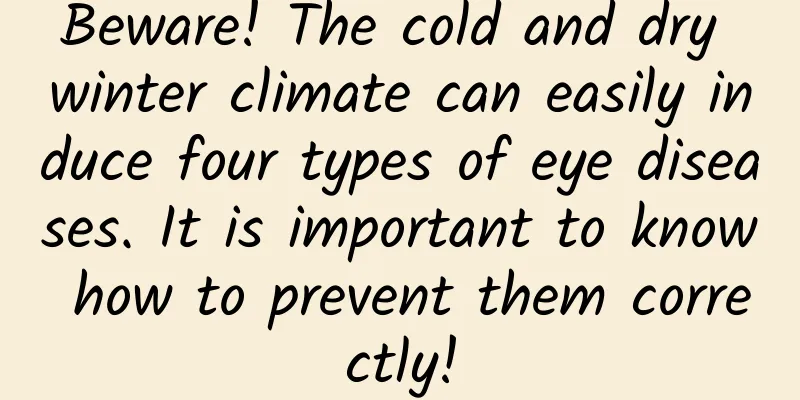Beware! The cold and dry winter climate can easily induce four types of eye diseases. It is important to know how to prevent them correctly!

|
It is winter, the climate is cold and dry, and the dry and cold weather can cause damage to the eyes, easily leading to dry eyes, foreign body sensation and decreased vision. At the same time, it is easy to induce a variety of eye diseases, including dry eyes, glaucoma and eye stroke, so how to prevent it! 01 Tears in the Wind In the north, there are more windy and sandy weather in winter. The cold wind can irritate the eyes, stimulate the secretion of a large number of tear glands, and cause the muscles around the lacrimal ducts to contract, resulting in tears in the wind. Especially for the elderly, the function of the tear glands and tear ducts is impaired, which makes them prone to wind tears. If the nasolacrimal duct is unobstructed, it may be chronic conjunctivitis or trachoma. Try not to go out in windy weather. If you must go out, protect your eyes, preferably wearing goggles. 02 Dry Eyes In the cold winter, people's outdoor activities are reduced. Staying in heated rooms or using air conditioners for a long time can accelerate the evaporation of tears. In addition, watching TV or playing with mobile phones for a long time will lead to excessive use of eyes, which will cause dry eyes and foreign body sensation. There are many factors that lead to dry eyes, including vitamin deficiency, endocrine disorders and immune diseases, and these factors need to be actively treated. If dry eyes are caused by a lack of tears, you need to use artificial tears as directed by your doctor, and choose preservative-free ones to moisten the eyeballs and relieve discomfort. Blinking your eyes properly helps with tear secretion and better moisturizes the eyeballs. 03 Eye stroke Winter is the peak season for eye stroke, which is medically known as retinal artery occlusion. Due to the stimulation of cold air, blood vessels spasm occurs, resulting in visual impairment, decreased vision, and dark shadows in a short period of time. The blindness rate caused by eye stroke is over 80%, so if there is any abnormality, you should call 120 for emergency treatment immediately. There is only 1.5 hours of golden treatment time. Especially patients with arteriosclerosis, hypertension and diabetes should pay more attention. 04 Glaucoma As the temperature drops, the sympathetic nerves become abnormally excited due to cold stimulation, and the intraocular pressure and blood pressure rise rapidly in a short period of time, thus causing glaucoma. The main symptoms are decreased vision, swelling and pain in the eyes and eye sockets, often accompanied by nausea, vomiting and dizziness. People over 40 years old, with high myopia or high hyperopia, hypertension and diabetes are at high risk of glaucoma. Tips for eye protection in winter: You should be careful to protect your eyes in winter. When using a computer, you must have a correct posture and try to keep your eyes level with the computer screen, which can reduce the area of your eyeballs exposed to the air. At the same time, stay at least 50 to 70 cm away from the computer screen, do eye exercises or look into the distance for 10 minutes every few hours; eat more fresh vegetables and fruits. Source: Aier Eye Hospital |
Recommend
Drainage is ineffective? Try these 4 methods
Your drainage is not effective? It’s not that the...
User operation: AARRR user model and traffic pool model explained in detail!
1. What is the AARRR user analysis model? AARRR i...
In-depth analysis from 0 to 1: What is KOL operation?
What I talk about most with friends recently is K...
The United States announced the cancellation of Hong Kong’s special treatment! What impacts will it have? Attach details
As the epidemic changes, new problems have also e...
He chases his dream of deep blue sea with the wind blowing on the sea
"A seagull flies thousands of miles on the w...
International Volunteer Day丨Do you know these things about volunteer service?
I am Dongdong Miao, International Volunteer Day i...
Aiti Tribe Stories (19): How could you not know these things when you switched to IT technology? !
[51CTO.com original article] If someone asks you ...
Ma Bingbing-Python Big Data Full Stack Engineering
Ma Bingshi-Python big data full stack engineering...
Why iPhone 6s shuts down abnormally? Apple still doesn't know
After the iPhone 6s automatically shut down frequ...
It is a foregone conclusion that OLED will dominate the market. What is Skyworth’s winning strategy?
Since the end of the International Consumer Elect...
Enshi Mini Program Agency Company, how much does it cost to be an agent for a watch mini program?
Is it easy to be an agent of Enshi Watch Mini Pro...
Zhiji LS6 sales volume increased for eight consecutive weeks and exceeded 2,000 units for the first time
Recently, Zhiji Auto announced that the weekly sa...
Is the agency fee for the Artel prenatal education mini program high? Atailer Prenatal Education Mini Program Agency Fees and Process
How much does it cost for Artel to be an agent fo...
Detailed explanation of Baidu’s bidding method!
What are the bidding methods of Baidu ? What do C...
Short video marketing, save these strategies quickly!
In recent years, with the sharp increase in deman...









